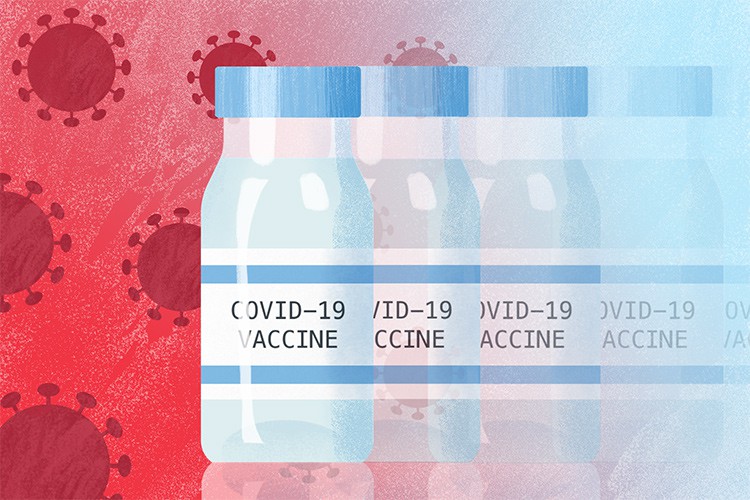Health department must hand over Covid vaccine procurement documents
The Health Justice Initiative wants to assess the legality and cost-effectiveness of the pandemic rollout
The health department has ten days to hand over documents on its procurement of Covid vaccines. Illustration: Lisa Nelson
- The Pretoria High Court has given the health department ten days to hand over documents relating to its negotiations and procurement of Covid vaccines to the Health Justice Initiative.
- Judge Anthony Millar says the department’s “confidentiality” arguments do not withstand legal scrutiny.
- The Health Justice Initiative wants the documents to assess the legality and cost-effectiveness of the deals which were struck at the height of the global pandemic.
The national Department of Health has been ordered to hand over all documents relating to its negotiations and procurement of Covid vaccinations to the Health Justice Initiative (HJI) within ten days.
The HJI wants the documents so that it can assess the legality and cost effectiveness of the deals the government struck with vaccine manufacturers and suppliers at the height of the pandemic.
The Minister of Health and the department, cited as respondents in the application before Pretoria High Court Judge Anthony Millar, had refused to disclose the documents following an application by HJI in terms of the Promotion of Access to Information Act (PAIA).
But Judge Millar has said none of the reasons provided by the respondents stood legal scrutiny and it was self-evident that there was a public interest in the disclosure of the records.
He said it was not an issue between the parties, that the Organisation for Economic Co-operation and Development (OECD) had recommended that vaccine planning and rollout should be open to public scrutiny and required proactive disclosure of information.
He said as of February 2022, more than 30 million vaccines had been administered in South Africa, at a great cost, with an allocation in the 2021 national budget alone of R10-billion.
The HJI had first submitted its application, in terms of PAIA, to the department in July 2021 for access to copies of documents relating to the negotiations and conclusion of agreements by the minister and the department for the supply of vaccines.
It was only in January 2022, that the department replied: “As per confidential agreements, the National Department of Health is not at liberty to divulge the information.”
Judge Millar said that when access to a record is refused, it was necessary for the refusing party to state adequate reasons for this, and the provisions in the Act these relied upon.
He said in this instance neither the existence of the specific documents nor the parties to them were disclosed. The refusal was a blanket one with no basis laid other than the repeated referral to confidentiality.
The precise terms of each of the confidentiality clauses were not disclosed, and it was argued for HJI that even in the face of a confidentiality clause, the non confidential portions ought to have been disclosed.
Judge Millar said the respondents had failed to show that the information and documents fell within the ambit of the exemptions of the Act.
They had also not shown, as they had argued, that there would be any adverse consequence from disclosure, that it would cause commercial harm, or that manufacturers and suppliers would be reluctant to engage with the government in confidence because the government might be compelled by third parties to disclose information provided to it in confidence.
Judge Millar said respondents had also argued that there is no basis for the application of the public interest override provided for in the Act and that the HJI bore the onus to show that there was public interest.
He said he was unable to agree with this.
“The grounds advanced by the HJI for public interest were that the department admits it bound itself to confidentiality clauses which are at odds with its constitutional obligations, that media reports suggest the department procured vaccines at differential and inflated prices, and on unreasonable and unenforceable terms.”
He said the HJI had submitted there was a shroud of secrecy over the negotiation, procurement and payment process, which was “the very mischief which the Constitution and legislation such as PAIA seeks to address’”.
It had also referred to department reports to Parliament suggesting “grotesque” agreement terms, including far-reaching indemnities and the establishment of a vaccine injury fund.
The HJI had further submitted that every single one of the over 30-million South Africans who received vaccinations as well as those who had chosen not to, had paid and continued to pay through the fiscus for what was negotiated by the department.
Judge Millar said, “In my view, it is self-evident that there is a public interest in the disclosure of the records.”
He set aside the refusal to grant access to the records and ordered the respondents to hand over the documents within ten days. He also ordered the respondents to pay the costs.
Support independent journalism
Donate using Payfast

Don't miss out on the latest news
We respect your privacy, and promise we won't spam you.
Next: Lottery loses court case after lawyer no-show
Previous: Residents of Afrikaner enclave want to be integrated into City of Tshwane
© 2023 GroundUp. This article is licensed under a Creative Commons Attribution-NoDerivatives 4.0 International License.
You may republish this article, so long as you credit the authors and GroundUp, and do not change the text. Please include a link back to the original article.
We put an invisible pixel in the article so that we can count traffic to republishers. All analytics tools are solely on our servers. We do not give our logs to any third party. Logs are deleted after two weeks. We do not use any IP address identifying information except to count regional traffic. We are solely interested in counting hits, not tracking users. If you republish, please do not delete the invisible pixel.

